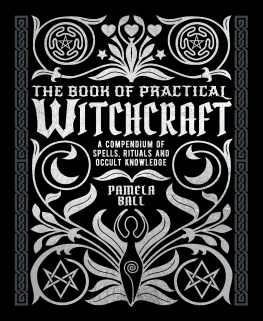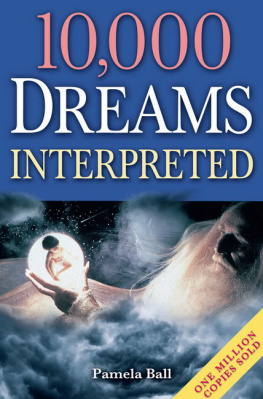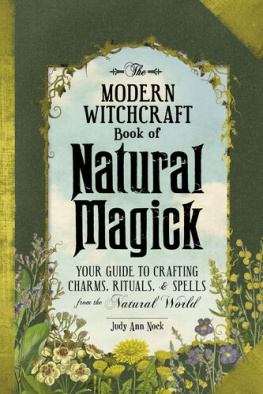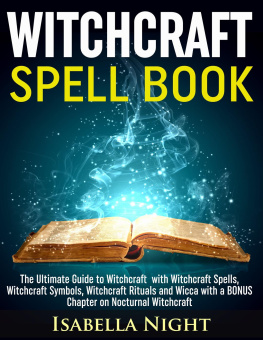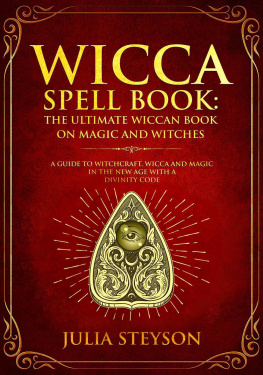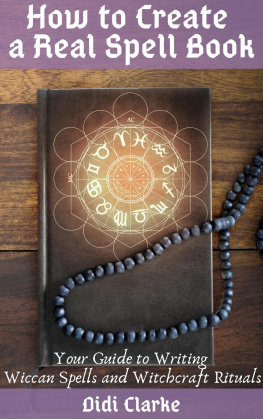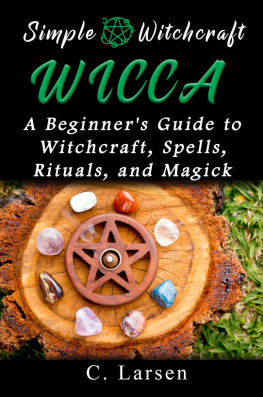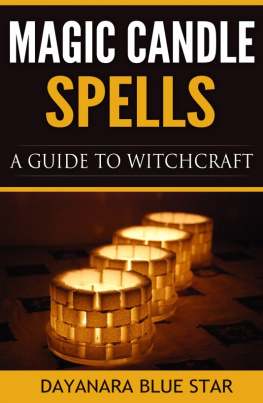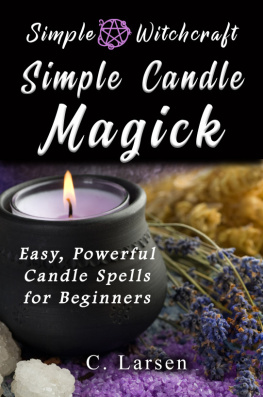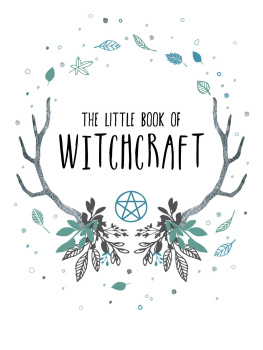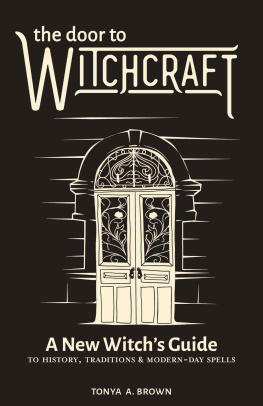
AN WE HARM NO-ONE
Lest we be accused of undue influence, as have others before us, we hereby take responsibility for the words written within the pages of this book. We do not, however, take any responsibility for your performance of the spells and rituals herein nor for the results of the use of the Powers. Such performance and result is a transaction between you and those Powers, for which you yourself must take responsibility. We trust that this book will help you in your search for understanding and offer a blessing to help you on your way.
May the Divine be with you.
May you always be guided, guarded and protected.
INTRODUCTION
The desire to change and improve that which we have has been around for many thousands of years, if not since humans first walked the earth. Magic and spell-working have always been a part of that, and indeed still are today. Anyone who practises any form of magic, including spell-working, needs to be grounded. This means having both feet firmly planted in reality and also having a basic knowledge of what magic is and is not, what spells can and cant do, and what with practice you can do with the tools, information and knowledge you have. This book sets out to give you that information in as succinct a manner as possible.
It is sometimes best not to attempt any definition of ancient magic and magical belief. However, in any discussion of magic and its practitioners we must take account of a period in which the magical traditions of several different cultures coalesced and merged into a type of international and even multicultural magical practice, with its own rituals, symbols and words of power. This occurred in the Mediterranean basin and the Near East from the 1st to the 7th centuries and is the basis of most of the early, more intellectually based, systems of magic.
The pursuit of magic is, in part, the result of the human desire for control. In this period there was a need to control the natural environment, the social world, and the outcome of those forces we did not fully understand. This underlying desire for control comes to the surface most often in times of change, as we have seen repeatedly over the last fifteen centuries. During this time the techniques may have been modified, but the goals have remained the same. The basic laws of magic, of control, still apply today just as they have always done.
CURIOSITY, EXPLORATION AND SECRECY
One of most interesting characters from early times was Abraham Abulafia (124095), who made available much arcane knowledge, which ultimately formed the basis of Kabbalah. Believing in the divine nature of the Hebrew alphabet, he held that God cannot be described or conceptualized using everyday symbols. He therefore used abstract letter combinations and permutations (tzeruf) in intense meditations lasting for hours to reach ecstatic states.
These were spells in the real sense of the word since they literally spelt out the keys to altered states of consciousness failure to carry through the keys correctly could have a far-reaching effect on the careless practitioner, resulting in madness and other states of illusion. Again, these beliefs have been brought through to the modern day and used to great effect. Controlled use of altered states of consciousness, backed up by empirical evidence, is still one of the most potent tools a magical practitioner can have.
The Renaissance period in Europe saw the coming to prominence of many secret societies and scholar-magicians. Because of the burgeoning natural curiosity encouraged by Renaissance principles, a new importance was placed on the actual controlling of the forces of nature. The basis of magic-working had previously been seen as harnessing the power of spirits and demons. Now, additionally, the human mind was a factor to be considered and magical working was geared to gaining power, not only over external forces but also over internal states. Much good work was done in understanding the interaction between the spiritual realm and the physical, and how changes can be brought about within the latter. Both Kabbalah and alchemy, one of whose objectives was to transform baser metals into gold, became very popular.
By the 17th century, folk magic and witchcraft were being used side by side, often with little differentiation between them.
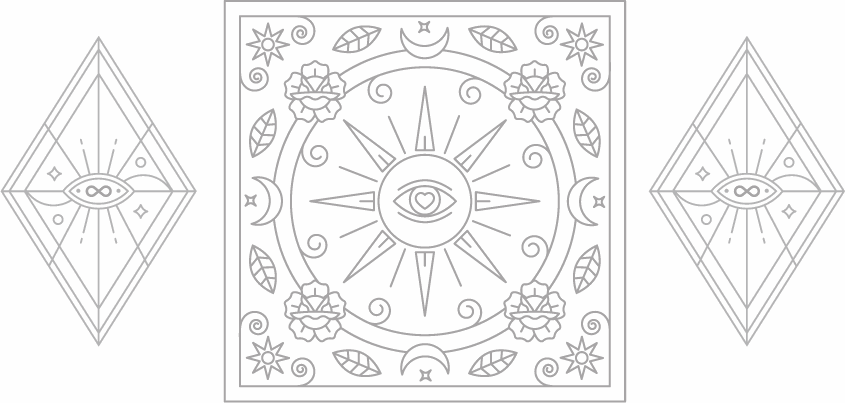
Most people were alternately fascinated and frightened by energies that offered control of nature coupled with opportunities for enormous wealth. However, witchcraft then became more widely identified with demonic or satanic entities opposed to God and therefore was deemed to be wholly evil. A heretic was defined as a traitor an offence punishable by death and the persecution of those who did not conform to the so-called religious thought of the day became relentless. Suspicion alone was enough to ruin a life. This caused the practice of witchcraft to go underground, not just in terms of secrecy but in actuality, for example in the use of caves and secret places, such as Wookey Hole in Somerset, England.
The practice of magic survived, however, and by the 19th century there is evidence that many secret societies, each surrounded by its own unique mysteries, still survived. They were often formed by highly creative people who were searching for new and different ways of self-expression. Many of the beliefs of these societies were based on the old traditions, though some differed widely from those of the old alchemists. Rituals and invocations were developed that were supposedly based on the ancient rites, often with a very strong bias towards melodrama. Secret societies have also survived into the present day, though not always with full awareness of the fact that their rituals are based on magical practice.
WITCHCRAFT TODAY
Today there is a rich heritage of magical practices and beliefs on which we can call to satisfy our need for control over our own lives. Where conventional religion no longer offers an outlet for our sense of belonging, we can turn to magical rituals and spell-making to honour our origins. We can make use of the knowledge and practices that have been handed down to us and have survived, often in the face of adversity. The principles that form the basis of magical practice still operate today, as do the various belief systems associated with them.
Many of these belief systems take their names from the Greek word theo, meaning god. One can be polytheistic (belief in many gods) yet see all things as being part of one great mystery, or monotheistic (belief in one god) yet recognize that for others there may be many gods. Again one might be atheistic (with no belief in god), with simply a belief in ones own power.
In the working of magical spells no one can tell you what to believe you must make your own decisions. The words Paganism and Pagan come from the Latin paganus, meaning rustic or belonging to the country. Largely, ancient Paganism was pantheistic (believing in all gods) but today the word has come to mean someone who does not recognize the God of the main religions of the world, such as Christianity or Judaism. Irrespective of what you choose to believe, magic and spell-making is aligned closely to a belief in the power of nature and there is the need for love and respect for all living things. How we express that will be mirrored in our spell-making.

